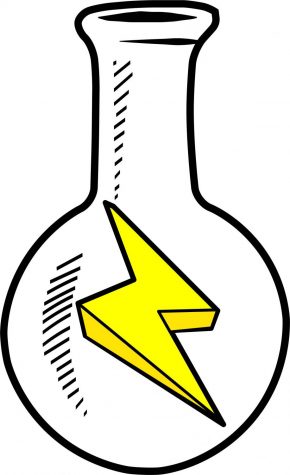Baby: Is She Truly Like Lightning in a Bottle?

The history of the universe was changed on Nov. 10, 2014, when the great philosopher and pop sensation Børns released the song “Electric Love,” startling the country, the world and most of the intelligent life in the universe with a bold proclamation. In this brilliant work of art, the legend himself made a statement so controversial that even the greatest creatures of the universe now fear his mental intensity. He simply stated: “Baby, you’re like lightning in a bottle.” Since then, historians, scientists, legends and gods have spent their lives wondering about a single question. Because Børns unfortunately, provided no evidential backbone to this statement, he made everyone wonder if it was really true. Is Baby like lightning in a bottle? What did Børns mean by this?
In order to answer this question and truly understand everything, we have to go way back in history. According to Wikipedia, the first time lightning in a bottle was used was literally, when Benjamin Franklin did his kite experiment and attempted to capture the electricity from lightning in a bottle. Now, what does this mean? Was Børns really trying to trap someone in a bottle? He refers to them as “Baby,” so it obviously isn’t a stranger he’s after. Maybe it’s his child? This would make sense considering that the next verse is, “I can’t let you go now that I got you,” implying that he has trapped his child and will not let him go now. While it seems like we have solved the age-old question already, the answer is too simple; we’re going to have to dig deeper.
Although it seems pretty unlikely that Børns was speaking metaphorically here, we must look into that idea. As a metaphor, “lightning in a bottle” refers to succeeding in a way that is very unlikely and, as a result, very lucky. Maybe Børns is trying to impress us with his bottle-trapping abilities? A child would be impressive; however, it’s not like he has a sailing ship or anything of that nature. It is clear that a metaphor is not the answer because Børns would have no reason to brag about something so relatively unimpressive.
Attempting to solve this problem on my own was clearly a lost cause, so I turned to some of my fellow students for their input. Senior Josh Kamphius has a different take on what Børns meant by this lyric. “I think maybe the lightning and the baby are in the bottle together,” he says wisely, “and if you open the bottle, the baby may escape and ride the lightning to a far-away place.” This is definitely an interesting idea to look into, and although a bottle may be too small to carry both a baby and a lightning bolt, it’s possible that a large jar—or even an aquarium—could work. This theory seems plausible because “baby you’re like lightning in an aquarium,” just doesn’t have the same ring to it, and therefore wouldn’t work with the melody of the song, forcing Børnsto to use the word bottle, even if he had to take a little creative liberty.
Junior Evan Sims had a preposterous take on the issue, stating that, “capturing lightning in a bottle is a difficult task that is considered lucky once achieved, so maybe it is saying that the girl he is pursuing romantically is a rare person, and would be hard to get.” I got angry when he said this because we were working towards a real goal and there was no time for ridiculous and outlandish thoughts. This was not a time for jokes; it was a time for true passionate thinking. I had no choice but to banish Evan from the project after this absolutely insane idea, as he clearly was not working towards the same goal as the rest of us. We had to go on without him.
After months of late nights and gruesome work, we finally came to a conclusion. This was not a problem that was meant to be solved. Some questions frankly are not meant to be answered, and this reporter, as well as the rest of the universe, will be left in a permanent state of confusion. Was Baby truly like lightning in a bottle? We may never know.

Luke Kreidl is a senior at BHS and a new member of The Owl staff. He enjoys writing and hopes to be creative with his stories, writing about whatever comes to mind. Luke plays soccer at Boulder High and has played for all four years of high school. Luke has a dog who periodically shows up on google meets until she gets bored. Luke also enjoys lying in bed, staring at the ceiling, and lying on the floor, staring at the ceiling in his free time. Luke enjoys green grapes because, as his grandmother always said, “purple grapes are Satan’s gateway to the soul.”


James • Dec 12, 2020 at 5:04 pm
This is a fascinating article. I truly believe that Josh Kamphuises had the most logical and likely explanation. Borns was probably talking about how the baby trapped in this bottle and opening it could lead to a whole number of interesting outcomes like riding on lightning. I liked the student interviews that were included in the article even if some of them were preposterous and all the scientific research that took place in order to create such a prestigious article.
stella • Oct 2, 2020 at 1:53 pm
Baby is not like lightning in a bottle but Baby does in fact “got back”
charlie • Oct 1, 2020 at 8:46 pm
this fire no cap. teacher best be giving u an A